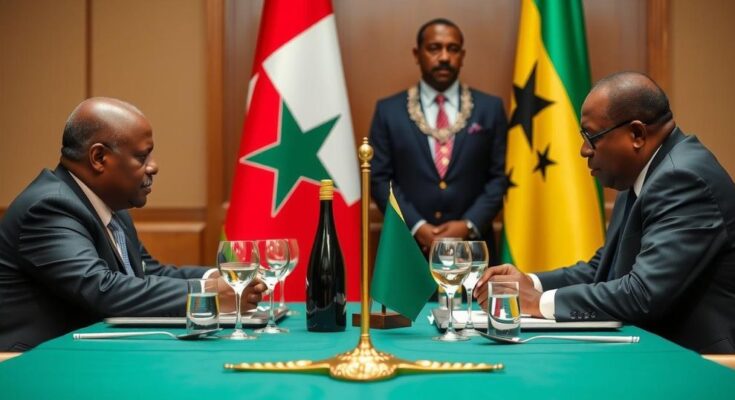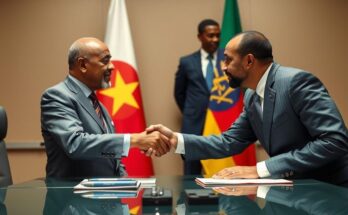Somalia and Ethiopia are restoring diplomatic relations after a significant visit by President Hassan Sheikh Mohamud to Addis Ababa, aimed at mending a year-long rift. Both leaders confirmed their commitment to re-establishing ties and discussed trade and security collaboration against extremism. Despite this progress, uncertainties remain regarding Ethiopia’s maritime access related to its Somaliland deal.
Somalia and Ethiopia are poised to resume full diplomatic relations following the visit of President Hassan Sheikh Mohamud to Addis Ababa. This visit represents a significant step towards mending a year-long rift that has unsettled the Horn of Africa. In a joint statement released on X, President Mohamud and Prime Minister Abiy Ahmed expressed their mutual commitment to enhancing bilateral relations through reinstated diplomatic ties in their respective capitals.
The historical tensions between the two nations have been exacerbated by Ethiopia’s aspirations for maritime access, alongside Somalia’s discontent over Ethiopia’s recent agreement with Somaliland, which included military and port arrangements. The diplomatic breakdown reached a peak last year when Somalia expelled Ethiopia’s ambassador following the Somaliland deal. However, a peace arrangement brokered by Turkey last month laid the groundwork for renewing ties, as both leaders reaffirmed their dedication to the peace accord during President Mohamud’s recent visit.
Additional discussions revolved around fostering trade and bolstering security cooperation to combat extremist threats within the region. Although there remains uncertainty regarding the specifics of Ethiopia’s access to the sea and the implications of its Somaliland agreement, there are emerging alliances among Somalia, Egypt, and Eritrea aimed at countering Ethiopian ambitions. Recent statements from Egypt’s Foreign Minister underscored this coalition’s commitment to regional security, asserting that external military presence in the Red Sea is unwarranted.
Egypt and Somalia are actively pursuing increased military collaboration, particularly in the context of the African Union Support and Stabilisation Mission in Somalia, where Egyptian forces now participate in efforts against extremist groups. This evolving geopolitical landscape signifies a complex interplay of alliances and interests within the Horn of Africa.
The relationship between Somalia and Ethiopia has been historically fraught with tension, primarily stemming from Ethiopia’s limitations in accessing the sea due to its landlocked status. This geographic challenge has often resulted in Ethiopia seeking territorial or economic engagement with neighboring regions, including Somaliland, which has contributed to heightened diplomatic strains. The recent years have seen Ethiopia engage in agreements that Somalia perceives as undermining its territorial integrity. The intervention of external actors, such as Turkey in facilitating a peace deal, illustrates the broader geopolitical interests at play in the region, particularly concerning security and economic cooperation.
In conclusion, the restoration of diplomatic ties between Somalia and Ethiopia marks a pivotal moment in addressing longstanding grievances and regional instability. The commitment from both nations to enhance bilateral relations and cooperate in trade and security is a positive development. However, the unresolved issues regarding Ethiopia’s deal with Somaliland and the broader regional dynamics necessitate careful navigation to ensure lasting peace and stability in the Horn of Africa.
Original Source: www.thenationalnews.com




